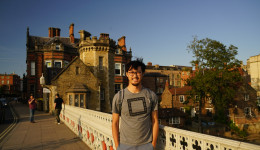Binan G



Instruments: Piano, Saxophone, Music
Styles: Classical


Binan G


Instruments: Piano, Saxophone, Music
Styles:
Classical
Where I Teach:
Ages Taught: 15-45
2009 Grade 10 Certificate Royal Conservatory of Music
Assistant to the Conductor to WPI Concert Band
I am lucky enough to be associated with this thing called music. As a kid, I was introduced to the piano by my dear mother, a pipa player (traditional Chinese guitar), who has always admired western musical instruments. I was never too serious until my teenage years when I met several teachers and friends (to this day) who have shown me how to read music properly and what it means to read it properly. It is to connect the unsaid messages by the composer through musical notes, and one must go beyond the surface of mere notes to fully decipher (or even sublime) the artistic intents. Then, one must learn how to be a good storyteller, first in a spoken language, then in songs, and lastly through the instruments. I hold a Doctorate in Applied Mathematics from the New Jersey Institute of Technology, a Master's from NYU, and two Bachelor's degrees from the University of Southern California in Mathematics and Economics. These degrees may not seem to add much to my musical background, but their very training solidifies my persistence in logical training, something much required in the study of music. In my spare time, a good friend and I have prepared podcasts on guiding classical music appreciation to a deeper level than simple song recognition. I used to arrange for and coach an acapella group based in New York. I also compose recreationally and transcribe piano music into symphonic expansions. I am a consistent goer of concerts at Carnegie Hall, Lincoln Center, 92nd Y, and Boston Symphony Hall, among many other places. It is the passion that keeps me in this field and encourages me to be knowledgeable of the things I teach. I hope that I can share this passion with you through my lessons.
I have proudly produced three students who are now independent music thinkers in their own rights. My first student was my mother, ironically, as she was the one who brought me to music. Now, she is a capable piano player whose repertoire ranges from Mozart to Chopin. She works harder on the piano than anyone I have met. My second student was a colleague at NJIT. She now maintains a solid technical background to tackle any music she would like. But more importantly, she can become her own judge of the sounds she makes. She has obtained an increased appreciation of classical music and improved her sensitivity to musical details. My third student had the strongest background, but the weakest connection to music initially. I have helped her listen rather than play. As she gradually develops a sense of good sound, her playing changed dramatically, and her practice management improved. She has become capable of learning old and new pieces by herself, as now she also feels much more connected to music, as a form of discourse rather than a technical display.
Fundamentals come from slow practice, and unfortunately, there is no true fun way of doing it. However, I pair technical work with listening assignments, so that the students actually see the point of fundamental training. Hanon is the one book that has stayed with me for two decades and I adhere to its various training regimens very closely. The book itself may be insufficient, but the auxiliary exercises I designed will improve the practice efficiency. I cater to students' interests in what they want to perform. But it is not always about performing, but more about expressing. Through the lessons and conversations, I will probe the students' various emotional connections and make recommendations. As a teacher, I must teach individually.
My teaching style revolves from teaching the music, not just the instrument. As a result, even if the student eventually becomes technically unavailable, he/she can still listen to great musical details and appreciate the sound world with depth and understanding. I expect my students to learn more on their own than from myself because I teach the way to learn in addition to the way to play. Students shall express their goals in the short, medium, and long term. Each lesson should conclude with a meeting minute that describes briefly what was worked on and what to expect next.


